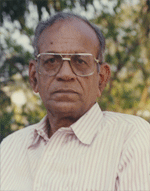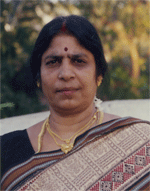 |
 |
 |
|
||||||||
| |
|
 |
|
||||||||
 |
|
|
|
||||||||
 |
|
||||||||||
 |
|
||||||||||
 |
|
 |
|
||||||||
| |
|
||||||||||
| |
|
|
|
||||||||
| |
|
|
|
||||||||
| |
|
||||||||||
| |
|
||||||||||
|
ABOUT US |
| V.V.R. CHOUDARY |
 |
|
'Man proposes but god disposes' would be the
apt phrase to describe the way Mr.V.V.R Choudary's life has shaped
up. Like a river, he has flown with the tide, taking the plunge
when it was called for. One would wonder why a successful cinematographer
would change tracks and take up repairing of camera lenses as
a full time job, and a deglamorised one at that, well that's the
man, Mr.V.V.R. Choudary for you. Daring to do what no one has
attempted before, has made him the most sort after man in the
business. |
|
After his stint with cinematography, he was appointed
as the chief of the special effects department at Prasad Productions
Pvt.. Ltd, special effects department by Mr. L.V. Prasad. It was
here that Choudary realized that there was no one repairing lenses
with factory trained knowledge professionally, therefore he decided
to learn the technique of repairing and cleaning camera and projector
lenses, from the manufacturing units itself. |
|
So with the help of generous friends and benefactors
like Mr. L.V. Prasad, Choudary went to Arnold & Richter manufacturing
unit who manufacture world famous Arriflex cameras in Germany,
and Angenieux factory in France that supplies 99% of their zoom
lenses to movie cameras in India. He had the training at Switzerland
in Bolex factory to repair 16mm cameras when moved to Los Angeles
and had the training in Mitchell camera corp. who were the pioneers
in most standard cameras. During the training period Mr. Choudary
noticed that women are attending lenses service and necessary
repairs, because it needs patience where "woman's job"
is more fit, for such jobs.. He learnt the working and repairing
of cameras and lenses after which he came back to India and started
his own services. |
|
He was made to understand that women were better
skilled for the job because women are known to be more patient
than men, and have a natural caring instinct that gets reflected
in the cleaning process of a delicate lens. Nimble fingers of
a woman are apt for the job in question and thereby Choudary says
that they have a natural aptitude for repairing lenses. Thereon
went on to teaching his wife the camera tricks of the trade after
she expressed her willingness. And he proudly goes on to state
that today her work is far more effective than his. |
|
Forty years is a long time in the business. And
all that experience reflects in his bagful of trivia on cinematography
- then and now. Mr. Choudary makes you see the art through his
viewfinder. And would explain in the simplest terminology, cutting
out the jargon. He can talk at length about why film- makers today
prefer cinemascope to 35mm, and how 400ASA has come a long way
from 16ASA facilitating shooting in lesser light than before. |
|
He can talk about the disadvantages of new technology
as well." if you see images in cinemascope, you will find
that the edges will be comparatively less sharper. Whereas in
35mm flat screening, the images are sharper throughout" says
Mr. Choudary. |
|
"Picture quality depends a lot on the lenses
used, more than the camera used. And, hence, the need to keep
lenses in good health. Due to aging, the colour coating on the
lenses may develop patches. Because of erasing or discolouring
or noticeable patches of fungi on the surface. We remove that
and recement it." he explains, elucidating why the job requires
a skillful mix of art and science. |
|
"The lenses are very expensive. It is a
reputation at stake. We cannot risk imparting the skill to a third
person-" So the family secret will stay with the kin, he
says quite assertively. "Even if you buy new lenses in the
world, you don't get a guarantee. But when people come to us for
service, we give them a minimum guarantee of one year, to five
years depending on the type of lenses" says Mr. Choudary. |
|
Cleaning about 20 to 30 lenses a month, the couple
are an industry of a kind, running the family business together,
popularly known as Kamal Cine Service. Operating out of, oddly
enough, a bedroom cum mini-lab complete with the requisite apparatus
and dark room fixtures, they work alone with no assistants or
successors in sight, creating a perfect picture. |
|
Today the Choudarys are a house hold name. Ask
any cinema hall owner in the country, more particularly in south
India and Bombay and they would vouch for the services rendered
by them. They have an indeed become a force to reckon with, excelling
in their chosen field beyond doubt. |
|
Mr. V.V.R. Choudary has become indispensable
to the world of cinema where camera lenses play a pivotal role.
After all at the end of the day a movie is seen through a lens
literally and that lens has to be cared for eventually. |
|
V. ARUNAKUMARI |
 |
|
The world comprises of different kinds of people,
you have some who follow trends, some who set trends, some who
just flow with whatever life has bestowed upon them, but it's
a rare occurrence that you have a trend setter in one of the most
uncommon and unheard of professions and it becomes all the more
surprising when the one in question is a woman. Well the trendsetter
we are referring o here is none other than Mrs. V.Arunakumari
of Kamal Cine Services. |
|
Mrs. V.Arunakumari can be proudly introduced
as the first and the only Indian woman who has taken up the repairing
of sophisticated glass lenses as her profession. It is indeed
amazing to see an Indian lady encroaching upon a predominantly
male domain. Thanks to her husband Mr. V. VTR. Choudhary who first
exposed her to the "fine art of lens servicing', and goaded
her to observe and practice the skill. |
|
After having started assisting her husband in
the profession, Arunakumari being a woman had to deal with the
apprehension of the customers who began to doubt her skills and
lack of formal training in the specified job. Hence on the advice
of the late L.V. Prasad, former president of of The South Indian
Film Chamber Of Commerce, she underwent two week training at the
Carl Zeiss Institute in Germany and the Angenieux factory in France.
And thereby became the first Indian woman to have trained at the
Carl Zeiss Company, home to some of the best lenses in the world. |
|
Angenieux has a huge factory in which the various
steps like cleaning, cementing, coating and painting are done
by separate groups of woman employees. They looked surprised when
Arunakumari told them she would do the entire process singlehandedly.
When they asked her to assemble a set of lenses, she did it immediately
and correctly, much to their amazement. |
|
The most important thing she learnt was the manner
in which lenses were to be handled. The caution and precision
with which these sophisticated glass lenses were cared for there,
was an eye-opener for her. And she also found many women working
in the factory unlike in India where women are not known to enter
this profession. |
|
This Certificate she obtained from these two
companies helped her launch her career. But this daring woman
will tell you , after much persistence that it doesn't take a
city education or a degree in physics or chemistry to master "
the delicately intricate art of chemically cleaning a fat slab
of lens and grading it on an auto-collimator after", but
loads of patience and a sharp mind, sharp enough to cut glass. |
|
Repairing a wide range of lenses from simple
photography lenses to heavier cine lenses, video camera lenses
and complicated operating microscopic lenses, Arunakumari states
that she takes care of only the "mechanical aspect of repairing
glass lenses, since she's not an expert in the electronics department.
Even with an increase in sophisticated digital and electronic
inputs into new cameras, her concern lies with the care of the
actual lens of these sophisticated cameras. |
|
She says, she has to exercise extreme care, while
separating the glass from the fixture, as these shooting camera
lenses are really expensive and cost as much as 12 lakhs. "Correcting
and assembling, the lens can be painstaking, tedious and time
consuming depending on the defect at hand, but I don't give up
till I have finished, even if it means sitting late into the night
"says Arunakumari. |
|
The defects on a lens vary from "dust, glue,
fungal spots, abrasions and discolouring to construction displacements",
each calling for a separate set of skills, instruments and cleaning
agents, she adds. On the whole she sums up the job as one that
requires immense patience, a calm temperament and perseverance. |
|
Arunakumari explains that she has so far avoided
having assistants, since most of the lenses she handles are imported
ones and are very costly. Wrong handling could prove disastrous.
Though her son Kamalakar has been trained in the craft he runs
his own web design company Deqube Technologies and chips inhelp
to his parents whenever needed. |
|
Arunakumari runs Kamal Cine Service as a full-time
business. The service is done at her residence itself, where an
element of secrecy is preserved. "There are two reasons why
we don't allow people to see what we do," she explains."
The first is obviously because we don't want to share our expertise.
And the second is because people rarely like to see what we do
to their lenses. It's like opening up a body for a customer who
has given his lens for cleaning. So, it's best not to see how
the surgery is being performed," she says good humouredly. |
|
In the beginning, she serviced only Arriflex
cine cameras manufactured in Germany, but when theatre owners
started pestering her to repair projector lenses, she was able
to remove the fungus formed in the joints of projector lenses
in the projector, which could not be done even by the manufacturers
themselves. |
|
Today Arunakumari boasts of a large and elite
clientele, which doesn't confine itself to the biggies in India,
but also spreads across neighbouring countries i.e. Bangladesh,
SriLanka. |
|
Well it is time to raise a toast, to this woman
of high caliber. Arunakumari a tenth standard drop out has gone
to prove through her deep sense of conviction, that nothing is
really impossible. After 12 years of mastering the craft she still
continues doing so with the same vigour and passion or should
we say much more? |